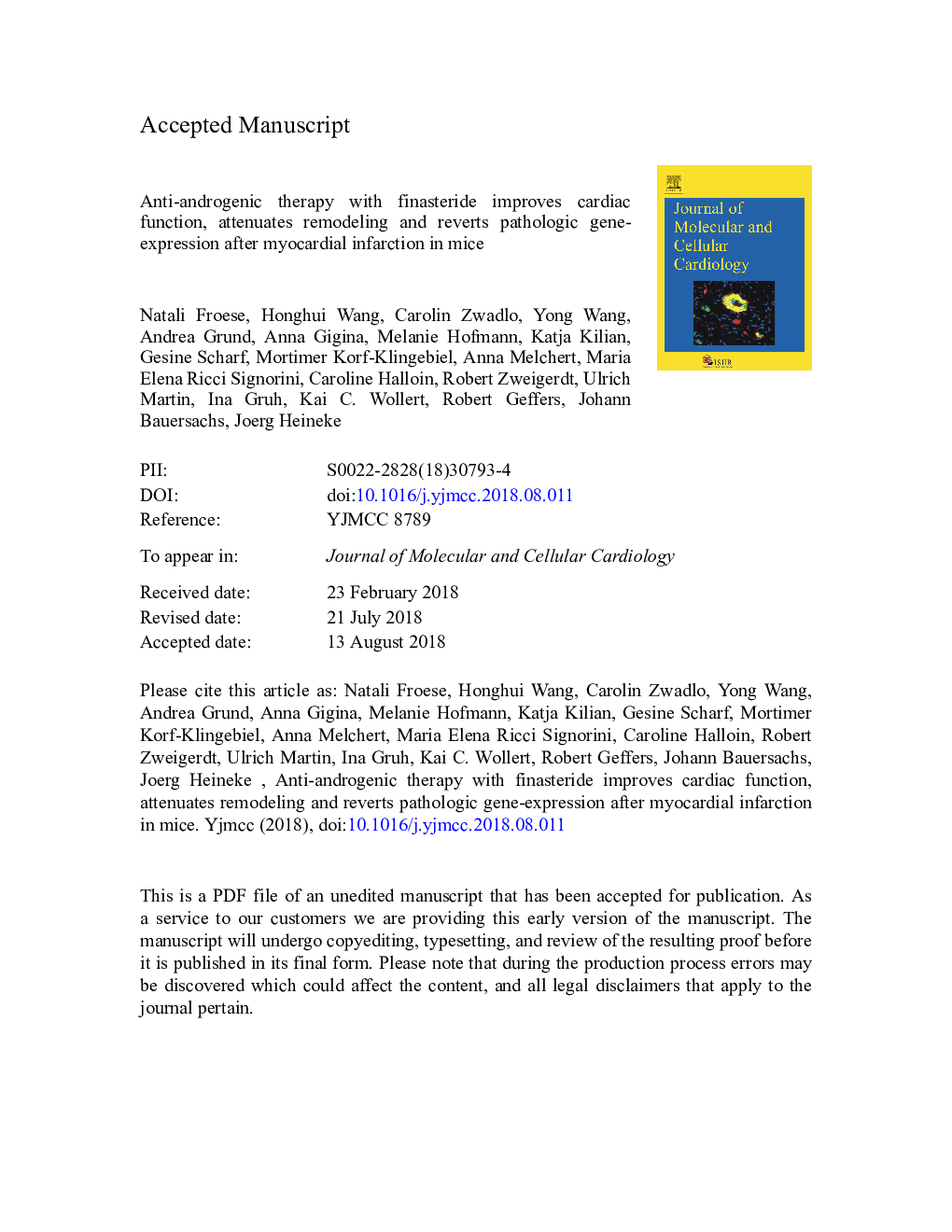| کد مقاله | کد نشریه | سال انتشار | مقاله انگلیسی | نسخه تمام متن |
|---|---|---|---|---|
| 8473101 | 1550383 | 2018 | 32 صفحه PDF | دانلود رایگان |
عنوان انگلیسی مقاله ISI
Anti-androgenic therapy with finasteride improves cardiac function, attenuates remodeling and reverts pathologic gene-expression after myocardial infarction in mice
ترجمه فارسی عنوان
درمان ضد آندروژنی با فیناستراید عملکرد قلبی را بهبود می بخشد، تجدید ساختار را کاهش می دهد و بیان ژن پاتولوژیک پس از انفارکتوس میوکارد در موش ها را باز می کند
دانلود مقاله + سفارش ترجمه
دانلود مقاله ISI انگلیسی
رایگان برای ایرانیان
کلمات کلیدی
تجدید ساختار میوکارد، تستوسترون، هیپرتروفی قلبی، سیگنالینگ،
موضوعات مرتبط
علوم زیستی و بیوفناوری
بیوشیمی، ژنتیک و زیست شناسی مولکولی
بیولوژی سلول
چکیده انگلیسی
Maladaptive cardiac remodeling after myocardial infarction (MI) is increasingly contributing to the prevalence of chronic heart failure. Women show less severe remodeling, a reduced mortality and a better systolic function after MI compared to men. Although sex hormones are being made responsible for these differences, it remains currently unknown how this could be translated into therapeutic strategies. Because we had recently demonstrated that inhibition of the conversion of testosterone to its highly active metabolite dihydrotestosterone (DHT) by finasteride effectively reduces cardiac hypertrophy and improves heart function during pressure overload, we asked here whether this strategy could be applied to post-MI remodeling. We found increased abundance of DHT and increased expression of androgen responsive genes in the mouse myocardium after experimental MI. Treatment of mice with finasteride for 21â¯days (starting 7â¯days after surgery), reduced myocardial DHT levels and markedly attenuated cardiac dysfunction as well as hypertrophic remodeling after MI. Histological and molecular analyses showed reduced MI triggered interstitial fibrosis, reduced cardiomyocyte hypertrophy and increased capillary density in the myocardium of finasteride treated mice. Mechanistically, this was associated with decreased activation of myocardial growth-signaling pathways, a comprehensive normalization of pathological myocardial gene-expression as revealed by RNA deep-sequencing and with direct effects of finasteride on cardiac fibroblasts and endothelial cells. In conclusion, we demonstrated a beneficial role of anti-androgenic treatment with finasteride in post-MI remodeling of mice. As finasteride is already approved for the treatment of benign prostate disease, it could potentially be evaluated as therapeutic strategy for heart failure after MI.
ناشر
Database: Elsevier - ScienceDirect (ساینس دایرکت)
Journal: Journal of Molecular and Cellular Cardiology - Volume 122, September 2018, Pages 114-124
Journal: Journal of Molecular and Cellular Cardiology - Volume 122, September 2018, Pages 114-124
نویسندگان
Natali Froese, Honghui Wang, Carolin Zwadlo, Yong Wang, Andrea Grund, Anna Gigina, Melanie Hofmann, Katja Kilian, Gesine Scharf, Mortimer Korf-Klingebiel, Anna Melchert, Maria Elena Ricci Signorini, Caroline Halloin, Robert Zweigerdt, Ulrich Martin,
